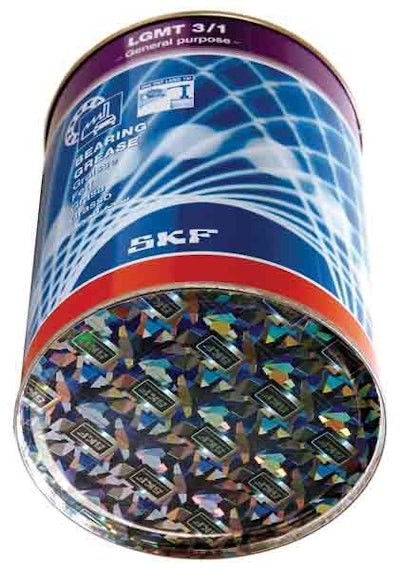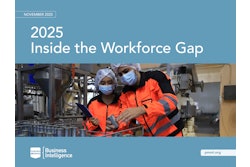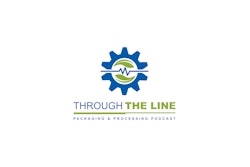Counterfeiting in all shapes and sizes has spun badly out of control. A good example comes from a recent New Yorker article about counterfeiting. It describes a Chinese company that tried to get away with a counterfeit Harry Potter novel and stupidly titled it “Harry Potter and the Leopard Walk-Up-to-Dragon.”
Packaging and brand protection departments of the world’s packaged goods manufacturers are busy looking for ways to keep the fast-spreading scourge of counterfeiting from doing any more damage than it’s already done.
Take SKF, for example. A leading maker of bearings, seals, and lubrication systems based in Goteborg, Sweden, SKF has a major presence in the Middle East. When management learned that an inferior grade of its high-performance grease was being sold in illegally copied cans, the company began searching for something they could add to their authentic cans that would be difficult to counterfeit. Their solution came by way of their long-term can vendor, Crown Specialty Packaging (www.crowncork.com). Crown introduced SKF to Protact™ Holographic, available through steel converter Corus Packaging Plus (www.coruspackaging.com). It’s a combination of PET film that is heat-sealed to an ECS (electrolytic chromium-coated steel). The film carries micro-embossed aluminized resin that captures holographic images.
“We worked with Crown and Corus to create a hologram design with our SKF company logo on it,” says Robert McConnachie, global sales and marketing manager for SKF’s Maintenance Products Div. “It’s very difficult for a counterfeiter to create the same hologram. The can is more expensive, but it’s worth it. We conducted a marketing campaign educating people that if the hologram wasn’t on the bottom of the can, it wasn’t SKF grease. Virtually overnight it killed sales of the counterfeit grease.”
More holography
Another brand authentication technology based on holography comes from the Tesa Scribos affiliate of the German adhesive tape manufacturer Tesa (www.tesatape.com). Called Holospot® lithography, it produces individualized, computer-generated holograms that are inscribed into a polymeric, pressure-sensitive security label by means of a high-resolution lithographic laser. The holographic information is stored inside the label, not on its surface, which makes it difficult to copy or manipulate. Data storage capacity is sufficient to store serial numbers, brand names, and company logos. Also, variable data can be included in every single security feature, giving each product its own identity.
Making Holospot especially intriguing is that it stores security data at four different levels. First, retailers or consumers can see the hologram with the naked eye. Second, a simple magnifier that can be given to wholesalers or other participants along the supply chain gives access to micro text for additional authentication.
The last two levels at which security data is stored are covert. A laser-magnifier gives access to hidden analog information. And at the fourth level, the security label contains digital data that is stored in a projection hologram and can only be activated by laser light. The devices used at levels three and four are restricted to internal specialists or investigators so that access to the covert data is always under control of the brand owner.
Tesa Scribos has lately targeted pharmaceutical companies in the UK as a market likely to value such a tool. But the first to use it on a large commercial scale was Germany’s Biersdorf for its Nivea-brand shampoo sold in Russia. Unscrupulous players in the distribution chain were copying Nivea bottles, filling them with whatever, and selling them to retailers at a deep discount compared to authentic Nivea shampoo. The retailers found the fakes attractive because they could charge consumers the same amount for the fakes as for the real thing and thus improve their margins considerably—though dishonorably. The use of Holospot technology had an immediate impact on this cozy little scam.
“Holospot worked well because it allowed us to monitor the retail chains ourselves,” says Mike Ellis, global head of brand protection at Biersdorf. “With each shipment into Russia, we included a note to retailers explaining how the Holospot technology works. We also made it clear that our own sales force, the people who are out on the road and in the stores constantly, would be looking closely at individual bottles and using Holospot tools to authenticate that the containers on the shelf are genuine. The message to the retailers was clear: If you buy Nivea brand shampoo from any source outside what might be called ‘the circle of trust,’ you are exposing yourself to counterfeits. Buy from the genuine source or run the risk of getting caught.”
The pharmaceutical sector
Countless anti-counterfeiting initiatives are underway in the pharmaceutical sector, where it isn’t just brand protection that’s at stake but rather the very lives of people who take packaged drugs assuming the contents are genuine.
One of the more notable initiatives to be announced recently is AstraZeneca’s Serialized Authentication Program. It’s a two-pronged effort to protect drug products with unit-level serialized tamper-evident security seals (TESS) combined with unique carton numbers (UCN).
“The pharmaceutical industry generally uses the term ‘mass serialization’ to describe what we’re doing on each carton,” says David Teale, product security director at AstraZeneca. “But we find that ‘unique carton number’ is easier to understand.”
The new program is being used first to protect supplies of Nexium, a prescription-only gastrointestinal drug that generated $5.2 billion in sales in 2006. The serialization will be implemented on paperboard cartons containing blisterpacks holding anywhere from seven to 28 tablets. The U.S. will not be included in the mass serialization program because the U.S. market—unlike Europe, where unit-dose packaging is far more common—sends tablets in bulk containers that pharmacists count out into plastic amber vials.
The unique number that each Nexium carton carries is in a 2D bar code printed on line at the AstraZeneca plant where packaging takes place. The bar-code printing system selected by AstraZeneca is the TIPS Serialization Product tracking solution from Systech Intl. (www.systech-tips.com). It includes Domino Amjet (www.dominoamjet.com) printers and algorithms generated by Systech technology. RFID was evaluated, notes Teale, but ultimately rejected not only because it was too expensive and too unreliable, but also because certain privacy issues have not been resolved. In the future, RFID will fulfill its potential, adds Teale. But right now it’s just not ready. 2D bar-code technology, on the other hand, is.
Second prong
The second prong of AstraZeneca’s Serialization Authentication Program is a serialized TE seal from Authentix (www.authentix.com).
“Unless we seal the carton with a tamper-evident seal, all we’ve accomplished with the 2D bar code on the carton is authentication of the folding carton. The tamper evident seal helps us guarantee that what’s inside the carton is genuine. The seal has a hologram on it, which is an overt layer of authentication that pharmacists or hospital personnel can see. It also has hidden security features that can’t be copied, including a unique 2D bar code printed in ink that is not visible to the naked eye.”
Teale describes the use of serialization on both carton and TE label as a “bookend approach.”
“We authenticate the pack as it leaves our manufacturing plant by uploading the unique numbers into a data base,” says Teale. “If the last person to handle the pack in the supply chain can authenticate the package against the data base, we know both ends of the supply chain are secure.”
And why use serialization at two levels instead of only one? Teale calls on that quintessentially British expression to answer: “Belt and braces. Besides, this is the layered approach that is universally recommended as one of the cornerstones of any anti-counterfeiting strategy.”
Teale goes on to say that a very important data base is being built as AstraZeneca’s Serialized Authentication Program rolls out.
Product security data management
“It’s a product security data management system where all the unique numbers generated at nine Nexium sites globally will be stored,” he explains. “It can be interrogated to see if individual packs are authentic. Without that single data base, we’d have to drill back down to each individual manufacturing site. The next step, then, is to bring our wholesalers in contact with the product security data base and integrate it, as well, with our central ERP (Enterprise Resource Planning) system. That way, we know exactly where a pack is at every stage along the supply chain. It’s adding track-and-trace functionality to the authentication functionality that’s built in from the start.”
Sweden was the first AstraZeneca market to implement this ambitious program, as Nexium cartons with both layers of mass serialization began rolling off packaging lines in mid-April. One fly in the ointment at this very early stage revolves around the question of scanners capable of scanning a 2D bar code. For AstraZeneca’s initiative to hit on all cylinders, pharmacies and hospitals must have such scanners in sufficient supply. At this point, they don’t.
“We’re working with EFPIA [European Federation of Pharmaceutical Industries and Associations] on funding for the 2D bar code scanners,” says Teale. “One idea is to establish a not-for-profit mechanism that will soften the cost of getting scanners into the hands of those who need them.”
The ultimate goal, says Teale, is to find a way for all stakeholders—hospitals, pharmacists, drug manufacturers, and governmental agencies responsible for the drug supply chain—to see value in a shared anti-counterfeiting strategy and to absorb some of its costs jointly.
While the above examples of anti-counterfeiting strategies are certainly encouraging, the battle against the bad guys will never end, says Tom Kubic, executive director of the Pharmaceutical Security Institute (www.psi-inc.org).
“We view counterfeiters as people who may be deterred by robust packaging features, but they’ll get around such features eventually,” says Kubic. That’s not to say that exploring new packaging technologies aimed at foiling counterfeiters is a waste of time, says Kubic. It’s just a way of acknowledging that technology alone is not a silver bullet.
“Constant technological development must be continued, but it must be complemented by heightened public awareness and regulatory enforcement,” says Kubic.



















